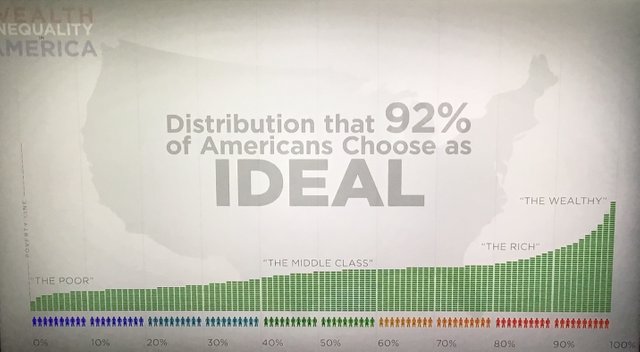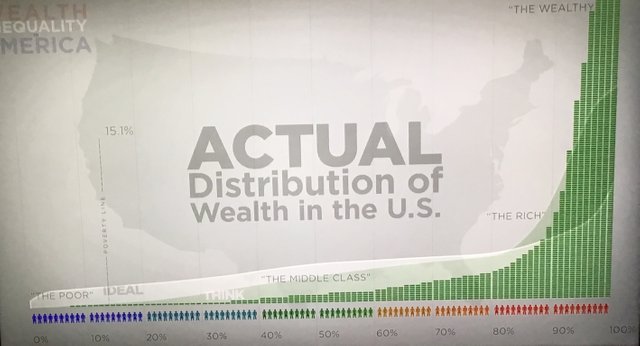Philanthropy: Praiseworthy Or Propaganda?
PHILANTHROPY: PRAISEWORTHY OR PROPAGANDA?
CHAPTER FOUR
In the last chapter we ended with the following observation:
‘The presence of a powerful elite with kleptocratic tendencies, running societies on the incompatible assumptions of scarcity and infinite growth, have worked to sustain poverty rather than truly to eradicate it. This should not be thought of in terms of conspiratorial plotting. Rather, it is the evolutionary outcome of the selfish pursuit of material wealth via whatever method can be gotten away with, let loose in societies with a pre-existing disproportionate advantage for some that changes the psychological makeup of the rest in ways that lead to unsustainable exploitations of the poverty that cannot be eradicated, for to do so would be to bring down the very system that the elites depend upon for their position’.
Now, one might think that this assertion can be refuted by those examples of the problem-solving capacity of market competition turning a once-scarce resource into an abundant one. Aluminium, for example, was once a rare and expensive thing, but now it is so cheap we use it and discard it without a thought. Such examples really do not refute the claim that market competition seeks to perpetuate scarcity because we are talking about an overall condition that cannot be refuted simply by citing isolated examples of a particular resource that has been made abundantly available.
Ever since our technological capabilities became sophisticated enough to enable us to escape the Malthusian trap, we have seen the rise of various ways of artificially perpetuating scarcity. These have included psychological manipulations intended to mess with the ability to distinguish between genuine needs and frivolous ‘wants’, and the creation of a throwaway culture. Thus, although we still talk about the ‘economy’, what we actually have is nothing like an economy in the sense of what the root of that word referred to. Because, rather than striving to use our resources in as efficient a way as possible, given current technical knowhow (which is what we should be doing if we are really trying to economise) we seem determined instead to turn the world’s resources into junk to be thrown away and repurchased. After all, the goal in a consumerist culture is to sell more stuff, so the last thing you want is for people to be content with what they have (this ties in with the point about our ability to make intelligent choices over what we really need being messed with). We also have services that are less about helping those in need and more to do with extracting rent out of those in need by preying on their financial instability so as to get them more indebted, profiting from their desperation.
!
(Image from
This has resulted in two forms of socioeconomic sickness: The existence of needless poverty on one hand, and the existence of wealth obesity on the other. It really should disgust people that anyone should become a multibillionnaire in a world where others must subsist on less than two dollars a day. Sadly, for millennia ruling kleptocrats have used propaganda and other methods to keep the masses from developing revolutionary thoughts, so this complacency is not surprising.
As Gillian Tett of the Financial Times said, “most societies have an elite and the elite try to stay in power; and the way they stay in power is not merely by controlling the means of production, but by controlling the cognitive map, the way we think”. We see this ‘control of the cognitive map’ in the way our societies condition us to aspire toward the excesses of the wealthy and to accept many eminently solvable issues as intractable problems we should just accept as “the way it has to be”. It is all to do with the ‘need’ to perpetuate scarcity so the boundless growth of consumerism can continue to extract profit and the elites can maintain the structures that their privileged position depend upon.
Any call to seriously re-engineer society in order to achieve a more equitable distribution of material wealth tends to meet the same retort, which is that it can only lead to Leftist totalitarianism. Such a statement was echoed by Forbes writer Jeffrey Dorfman:
“Once you admit that income redistribution is fair, there’s no logical stopping point short of communism”.
There are a couple of flaws in this assertion. Firstly, it seems to forget that the market economy is itself a process of wealth redistribution. Perhaps Dorfman is one of those market ideologues with faith in the ‘invisible hand’ creating peace and harmony out of the selfish pursuit of competing to gain differential advantage over others? But, as Harvard researcher Jonathan Schlefer explained, “beginning in the 1870s, theorists...wanted to show how market trading among individuals, pursuing self-interest, and firms, maximising profit, would lead an economy to a stable and optimal equilibrium...after a century of work, they concluded that no mechanism can be shown to lead decentralised markets toward equilibrium, unless you make assumptions...regarded as utterly implausible”.
Market dynamics turn human frailty and misfortune into commodities to be exploited for profit. And the competition to find the commodities that can be sold at the most cost-competitive price encourages fraud (because what could be more competitive than successfully making money out of nothing but bogus claims?). This is why a totally laissez faire market operating absent of any kind of regulation will tend to destroy itself. But neoliberalism is driven toward turning everything into a commodity to be bought and sold for differential advantage, and those regulatory bodies are no exception to that rule. They can be corrupted into a means of conferring unfair advantage in the interest of selfish profit maximisation. “Crony” capitalism is really just the likely outcome of free market principles operating in the real world with its historic cases of hierarchical, redistributive societies that are prone to kleptocracy.

(How people think wealths should be distributed. Image from ‘Wealth Inequality In America’)
The other flawed assumption is that, if the goal is ‘fair’ income redistribution, then the logical stopping point is communism. Presumably, Dorfman means a society in which everybody gets the same income (that is, after all, how most people think communism is supposed to work). But how can that possibly be the logical stopping point if the goal is fairness? There is nothing ‘fair’ about equal pay across the board, given that individuals clearly make unequal contributions toward beneficial and detrimental outcomes. It does not bother me that some people are more materially rewarded than I am, and it does not bother most other people. When asked how wealth should be distributed, most people rightly dismiss full communism and opt instead for some measure of distribution that rewards the most productive while ensuring sufficient wealth at the bottom to alleviate relative poverty (defined as not being able to access the average lifestyle for that society). It’s just that this ideal redistribution is more equitable than what people believe is actually the case (and true wealth inequality is even worse than most people believe).

(How wealth actually is distributed. Image from ‘Wealth Inequality In America’)
Despite the fact that there is a public call to bring about greater equitability in wealth redistribution, every policy to bring it about tends to be dismissed by new-liberal ideologies as unworkable solutions that can only end in authoritarianism and the Gulag. For some reason, philanthropy comes out as the only viable means of patching over the harm caused by the selfish pursuit of material wealth. The question is, why?
REFERENCES
“The New Human Rights Movement” by Peter Joseph
“The Survival Manual” by Mark Braund and Ross Ashcroft